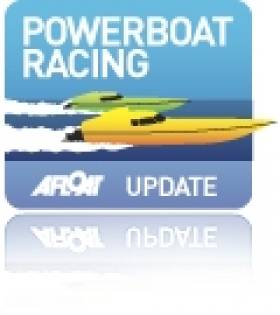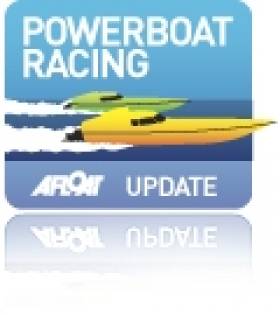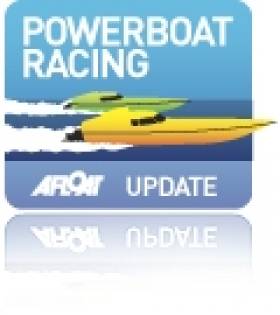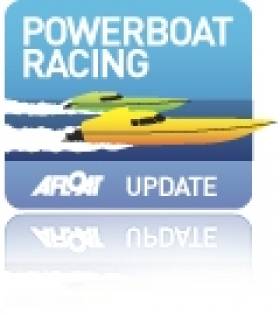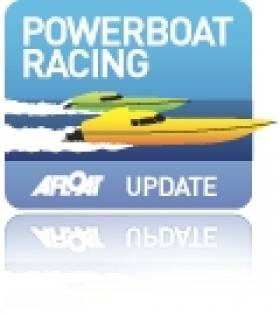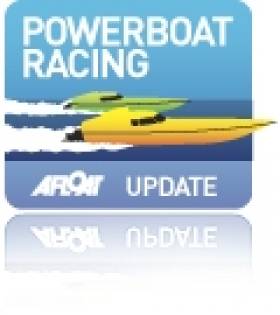Displaying items by tag: P750
Ireland Powerboat Team Take Bronze At P750 World Championships
Ireland have finished third overall at the P750 World Championships been held in Malta at the weekend. The top 4 places were divided by only two points. Team Ireland finished second in the circuit and following on from their first in the Surf and seventh in the long haul left them third overall and in Bronze medal place for the World Championships.
'Well done to the team who put in a massive effort to represent Ireland at these World championships', said the Irish Powerboat organisation's Denis Dillon.

Irish P750 Powerboat Race Team Take Bronze Medal in Cornwall
#p750 – Ireland's P750 powerboat racing team Colin Gaffney (driver) Lee Casey (co-pilot) Sean Dillon (Mechanic) took bronze medals at yesterday's conclusion of the P750 World Championship at the Pentewan Sands, St Austell, Cornwall, an event that featured some horrific weather conditions on the British south coast.
For the last 10 days P750 Powerboat racing teams from around the globe have being competing and representing their countries at the highest international level, the "UIM World Championships". Within this elite grouping was a Band of Brothers made up from members of Buccaneer Powerboat Racing Club and Irish Offshore Powerboat Racing Club. Colin Gaffney (Driver) Lee Casey (Co-Pilot) & Sean Dillon (Mechanic) all veterans of previous UIM European & World Championships decided to pool their talents under the Banner of Team air 21 and supported by The GYM (Rathgar) go to the World Championships, represent their Country and hopefully bring back UIM World Championship Medals to Ireland for the 1st Time.
The competition would not be easy, what lay ahead was 3 very different events. The 1st event was a 120 Km Race along the south coast of Cornwall, A grueling prospect in such a small boat. Team 21 has a setback and scored no points so they knew it was going to be a major challenge to get into the medals. Then on to the 2nd event the Surf Competition where the Team felt they had the edge, (Can't be as rough as Lahinch, can it?), 4 races in what turned to be high & windy surf. They found out that Team South African also liked the Surf, in the back & forth battle that ensued no quarter was given, alas Team 21 had to settle for 2nd a good result but both teams knew medals were not going to be easily won. The 3rd & final event was the Circuit Race where everyone knew the overall result and UIM Medal winners would be decided. Team 21 worked long hours into the night to get ready for this event as they damaged their engine on the previous days practice, worry set in, would the engine last? Had the Germans a faster setup? With the prospect of 4 Races and the loss of the Long-haul Points they knew they had to pull something special out of the hat. The Team got together and decided on a strategy that would see Man & Machine pushed them to the limit. It was a strategy that paid off as they won the Circuit Event which placed them ahead of the German team in the overall points giving Team 21 IRELAND the UIM WORLD CHAMPIONSHIP Bronze Medals.
"It's been an amazing ten days of racing, we have put blood sweat and tears into every heat, every event, every practice day and we followed this up with long evening maintaining both man and machine. During the event, we never let our teamwork falter and to achieve a win on the Circuit Event and a 2nd on the Surf Event against the best competitors in the world just goes to show what a few guys with determination and Teamwork can achieve.
We are very proud to have represented Ireland on the World Stage and to bring back "UIM World Championship Medals" in the P750 Modified Class is an honor and a privilege for all of us. The Team believes we have shown what can be achieved, we feel with the right support & sponsorship, Irish Powerboat Racing Teams & Clubs working together can ensure that Team Ireland competes in UIM European & World Championships into the future, in regard to our UIM Medals we hope they are the first of many."
P750 Thunder Action on Limerick Waters
#P750 – Last Sunday saw the start of a fresh new format for Irish powerboating when the opening round of the P750 Thundercat National Championships hit the water in the very heart of Limerick as part of the popular Riverfest celebrations.
Excellent weather drew thousands of spectators to the quays and they weren't to be disappointed. Race 1 saw the pre-race favourite 'Batman & Robin' (Clifden's Colin Snow & Conor Mullally) take a convincing win, but their afternoon changed dramatically when their prop became fouled with fishing line at the start of Race 2. That left a three-way fight between 'Ardmore Adventures', 'Aptriva' and 'The Gym' over the remaining two races and while Batman & Robin were able to carve their way back through most of the fleet, The Gym's Colin Gaffney and Sara-Jane Allen of Dublin ended up taking the spoils among a competitive 8-boat fleet.
While the Thundercat powerboats are more at home racing and jumping in heavy surf all around the World, their speed and turning ability makes them ideal for a city centre race - something which clearly proved a winner for crews and spectators yesterday.
Final Results:
1. The Gym - Colin Gaffney & Sara-Jane Allen (Dublin) - 20 points
2. Ardmore Adventures - Ronan O'Connor & Andrew O'Leary (Ardmore) - 17 points
3. Batman & Robin - Colin Snow & Conor Mullally (Clifden) - 15 points
4. Aptriva - Peter Sweeney & Chris Gleeson (Cork) - 13 points
5. Adventure Training Ireland - Donnchadh Mac Cobb & Carmel Guilfoyle (Dublin) - 11 points
6. Team Riverfest - Darragh & Gearoid Quaid (Limerick) - 10 points
7. Double Trouble - Aileen Mann & Temba Jere (Kinsale) - 9 points
8. Clifden Thunderkittens - Kathriona McHugh & Caitriona Staunton (Clifden) - 8 points
Irish Powerboat Racers Take to World Stage
Irish powerboat racers have taken to the world stage in the southern hemisphere for the first time. (SCROLL DOWN FOR PHOTOS)
Keith Plummer, Lee Casey and Colin Gaffney from Dublin, all members of the Buccaneer Powerboat Club and Sean Dillon and Gary Hogg from Clare, members of the Irish Offshore Powerboat Racing Club took part in the UIM P750 World Championships South Africa last week.
On the ground the reports were that even though the Irish competitors had their mechanical setbacks they kept pushing hard. When it came to the rough stuff in the surf they really shined, gaining a lot of respect from their fellow competitors.
Sean Dillon & Gary Hogg had two wins and a second in the surf discipline and finished fourth overall in the championships. Mechanical setbacks denied Colin Gaffney and co-driver Bongani Ndesi, a world Championship medal to accompany his European Championship medal won at the UIM P750 European Championship at Killaloe in October.
All five have reported that it was a great experience and that taking part showed them what a wonderful sport this is and being part of the UIM family. They all said how proud they were to be Irish and the first competitors with an ISA Powerboat Racing Licence to Race in South Africa.
The P750 class has gone from strength to strength in Ireland and 2010 saw a well-supported national Championship, the P750 Europeans being held in Ireland and Irish Competitors competing in the World Championships.
Pictures below by Paul Bedford/www.actionimages.co.zaColin Gaffney Boat No 21, Keith Plummer and Lee Casey From Dublin Boat No 22, Sean Dillon and Gary Hogg from Clare Boat No 49. Sean and Gary were the top Irish team being placed fourth.
Team Youghal Bay Takes Silver on Lough Derg
Chambers Reigns in Formula Two in Youghal
Lisnaskea driver Will Chambers was the winner of the Formula Two ISA National Powerboat Racing Championships run by Youghal Bay Boat Club. This new club did themselves proud under the direction of OOD and Club Commodore Padraig Brooks. A well attended event, the crowds on the Quays were witness to some superb racing. Four Racing classes were in attendance with the competitors coming from all four provinces in Ireland.
After a day of exciting racing the results were:
T850
Oliver Haire – North East Powerboat & Racing Club
Megan Anderson - North East Powerboat & Racing Club
Philip Haire - North East Powerboat & Racing Club
Formula 2
Will Chambers – Lisnaskea Boat Club
Liam Ralph – East Coast Powerboat Racing Club
Oliver Haire - North East Powerboat & Racing Club
Formula 4
Will Chambers – Lisnaskea Boat Club
Phil Boyle - Irish Powerboat Club
P750
Sean Dillon/Gary Hogg – Irish Offshore Powerboat Racing Club
Colin Snow/Conor Mullally – East Coast Powerboat Racing Club
Ronan O Connor/Fionan Little – Youghal Bay Boat Club
Next Race
New Ross September 12th
Youghal Boat Club Hosts Powerboat Race
Youghal Boat Club hosts its first national powerboat race hosted this weekend. Commodore Padraig Brooks sends this report: "All of our committee have been working hard these past few weeks, in conjunction with the Ardmore Pattern Festival committee to bring you the very best event possible. Thankfully everything is now in place and we eagerly anticipate the morning of Sunday, July 25th when we take to the water.
With a little bit of luck on our side, weatherwise, we should be racing in front of thousands of spectators on a exciting course right in the heart of lovely Ardmore Bay. The layout of the town means that this is a really great location both for those watching and those competing.
Racing will be in the P750 (Thundercat/Zapcat) fleet and the nature of same makes for an extremely spectator-friendly event. At time of typing we're hoping to have the largest ever domestic fleet of these boats gathered in Ardmore. Timings for the weekend are as follows:
Friday night - several of the boats are launching to watch the festival fireworks from the water
Saturday 1400-1630: Casual run-out and shake-down of the boats
Sunday 1230-1630: Full round of the ISA P750 National Powerboat Championships
Aside from the racing, Ardmore will be bursting with great activity for the whole family this weekend. We'd love to see you down here, and if you make it, be sure to come over and say hello.


























